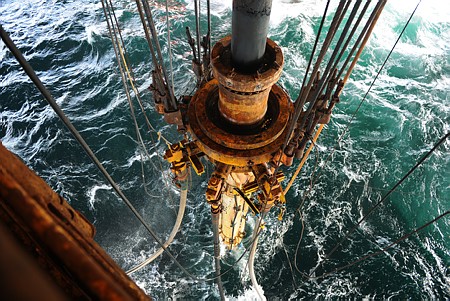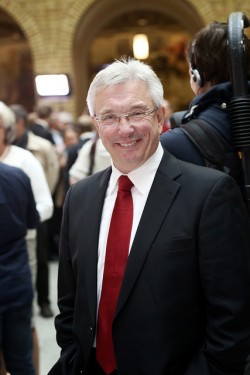To drill or not drill? That was the question debated in depth during the recent major oil industry conference, ONS, in Stavanger, where one outspoken industry player ended up blasting all those worried about oil’s effect on the climate. He claimed he spoke for many other oil workers and executives who frankly don’t give a damn about climate change.

Steinar Riise of the offshore service firm Ocean Installer minced no words when speaking with newspaper Dagens Næringsliv (DN) at ONS. He wasn’t at all happy about how concerns over global warming got a lot of attention during the week. He claims the climate debate has gone much too far.
“It’s completely unrealistic to believe that in 30 years we’ll only be driving electric cars,” Riise told DN. “I travel a lot. When I sit and drive in India, you don’t see a single el-bil. Even in the area where (luxury electric car maker) Tesla is based, there are hardly any Teslas.” He claims the popularity and relative abundance of Teslas in Norway is not representative.
Riise contended the world needs more oil and gas, not less. “Most folks in the industry think just like I do,” he claimed. “In Norway, there are a few environmental activists who scream loudly. That’s not what people think. I don’t like environmentalists who don’t use the facts.”
In Riise’s opinion, demand for oil and gas will remain high, and he was pleased by other trends he spotted at the ONS conference. He’s certain that the oil industry will pick up again, also for his own company, after the past two years’ slump caused by lower oil prices.
Defying ‘political correctness’
Riise wasn’t the only one defying what they called the “politically correct” rhetoric at ONS this year. Norwegian oil entrepreneur Erik Haugane of Okea, which includes Norway’s former oil minister and Center Party official Ole Borten Moe among its founders, told DN he’s sick and tired of such talk, even though the Norwegian oil industry is have a hard time winning popular support for the opening of new offshore areas for oil exploration.
“It costs a lot to be an atheist in a religious milieu,” Haugane told DN. He’s not at all happy that his own oil industry lobbying organization, Norske olje og gass, is claiming that a majority are binding themselves to climate-friendly rhetoric. He claims that geologists, like himself, have a different view on temperature- and climate change. “We don’t have a problem with the climate,” Haugane insisted. “If we have energy, we can tackle every change in the natural environment.”
Riise said he “just laughs” at the prospect of Norway being a leader in electric car use or anything else. “I was just in Houston,” he told DN. “All you see are huge cars (with) V8- or V12 engines on 10-lane highways.” Asked whether he or colleagues and counterparts in the oil business ever discussed climate concerns, he replied, “No, not at all. It’s not on the agenda at all.”

Riise’s and Haugane’s comments were highly troubling not only to climate- and environmental activists but also to Karl Eirik Schjøtt-Pedersen, the former top Labour Party politician and government minister who now heads Riise’s own oil industry organization Norske olje og gass.
“This damages the business,” Schjøtt-Pedersen told DN, as he scrambled to carry out some damage control. Riise’s free-wheeling and political incorrect comments were hurtful, it seemed, especially if Riise’s personal assesment that the oil industry really doesn’t care about climate change is correct.
“If a picture is drawn of an oil industry that doesn’t take this (climate change) seriously, I think it’s very unfortunate,” said Schjøtt-Pedersen, former key adviser to Jens Stoltenberg, the former Norwegian prime minister who now heads NATO. “Therefore I am very clear, with no reservations, in saying that the Norwegian oil industry stands fully and firmly behind the (UN) climate goals agreed in Paris, and we will do all we can to reach them.”
His organization is nonetheless lobbying hard for the opening of new offshore exploration areas and doesn’t need any new controversies now. Like many others in the business, Schjøtt-Pedersen firmly believes Norway’s oil industry is far less polluting and generates far fewer carbon emissions than oil industries in other countries. He claims more activity on the Norwegian Continental Shelf can help the UN reach its climate goals, not hurt it. “And when I’m so clear about that, it’s because the central players in the Norwegian oil business are,” he insisted. “Statoil is clear, Shell is clear, Total is clear. There is widespread support for this.”
Prime Minister Erna Solberg also promoted Norway’s allegedly climate-friendly oil industry at ONS, and used it to help justify her government’s controversial decision to open new areas off Norway for oil drilling and, eventually, production. She caught lots of criticism for putting Norway’s economy ahead of the environment.
Calls by major environmental organization Naturvernforbundet for Norwegian labour unions to stop supporting the oil industry, because of the jobs it creates, were also blasted by climate skeptics and other oil industry players this week. Jan B.M. Strømme, a former board member of Norway’s oil directorate and frequent commentator on oil issues, warned in newspaper Dagsavisen on Thursday about the consequences of cutting back Norway’s oil activity. While it may lead to carbon emissions finally falling in Norway, he wrote, they would rise elsewhere, as other countries take over the lost gas and oil production.
Strømme also warned that Norwegian technological development would be lost, along with its contributions to carbon capture systems. Unemployment in Norway would skyrocket, tax revenues to the state would be dramatically reduced, losses on oil investments would be large, the Norwegian welfare state could break down and Norway’s huge “Oil Fund” would become a “crisis fund” with a short lifespan, he claimed.
“An example of what happens when oil operations in Norway are slashed has been evident since oil prices fell,” Stømme wrote. “And it hasn’t led to many ‘green’ workplaces yet.”
Norway’s minority government coalition nonetheless faces challenges over its plans for a 24th licensing round. Neither of its two support parties in Parliament favour more drilling in Arctic areas, or off Lofoten, Vesterålen or Senja either. Debate will continue through the autumn and not least into next year’s national election campaign.
newsinenglish.no/Nina Berglund

